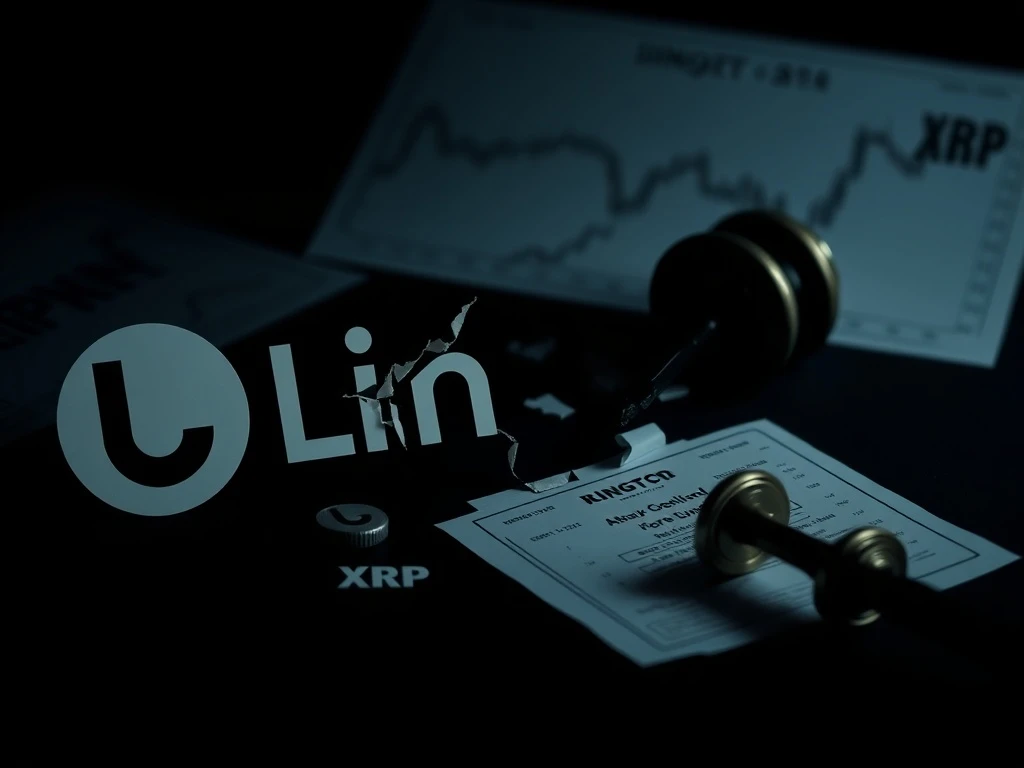Alarming Linqto Bankruptcy: What It Means for Ripple Shares and Private Investments

The cryptocurrency world is buzzing with significant news: Linqto, a private investment platform and notable Ripple shareholder, has officially filed for Chapter 11 bankruptcy. This development follows months of intense scrutiny and allegations of serious securities law violations, sending ripples through the digital asset community. For anyone tracking the broader crypto market, especially those with an interest in Ripple and its ecosystem, this filing is a crucial event that warrants a closer look.
Understanding the Linqto Bankruptcy Filing
On Monday, Linqto initiated its Chapter 11 bankruptcy proceedings with the U.S. District Court for the Southern District of Texas. This move came on the heels of mounting controversy surrounding the company’s operational practices and its handling of private securities. Linqto positioned itself as a platform enabling investors to acquire shares in pre-initial public offering (pre-IPO) companies, a niche that has attracted considerable interest in recent years. Among its significant holdings were 4.7 million secondary Ripple shares, a detail that has drawn particular attention from the crypto community.
The filing arrived shortly after Ripple CEO Brad Garlinghouse publicly clarified that while Linqto does indeed hold these secondary shares, Ripple itself has no direct business relationship with the platform. “Apart from Linqto being a shareholder, Ripple has never had a business relationship with Linqto, nor have they participated in our financing rounds,” Garlinghouse stated, aiming to distance Ripple from Linqto’s operational woes.
Key points about the filing:
- Linqto filed for Chapter 11 bankruptcy, which typically allows a company to reorganize its debts while continuing operations.
- The company’s platform was shuttered on March 13, effectively halting its revenue-generating activities.
- A first bankruptcy hearing is scheduled for Tuesday, 9:00 PM UTC, with key witnesses expected to provide insights into the company’s financial state and alleged past practices.
The Mystery of Ripple Shares Valuation
One of the more intriguing aspects of the Linqto bankruptcy is the lack of precise data regarding the value of its Ripple shareholdings. While a spokesperson for Linqto declined to specify the purchase date of these shares, private market data from platforms like Forge suggested that Linqto’s 4.7 million Ripple shares could be worth approximately $450 million, based on a secondary market price of $95.5 per share.
However, a court filing on Tuesday presented a different perspective, stating that Linqto’s private-securities offering vehicle, Liquidshares, holds securities with an “estimated fair market value in excess of $500 million” across 111 issuing companies. This discrepancy raises questions about the exact valuation and distribution of these assets, leaving investors and observers to speculate on the true financial impact of Linqto’s collapse.
Allegations of Securities Violations and Federal Probes
The road to bankruptcy for Linqto has been paved with serious allegations and federal investigations. Speculation about the company’s financial troubles began last Monday when The Wall Street Journal reported that Linqto was facing federal probes and a potential bankruptcy filing. The core of these allegations revolved around alleged securities violations and deceptive practices.
Reports suggested that an internal investigation within Linqto had unearthed evidence that “Linqto customers never owned the securities they thought they did.” Furthermore, Linqto allegedly marketed its services to individuals who might not have met the eligibility criteria to purchase stakes in private companies. Dan Siciliano, Linqto’s new CEO, reportedly stated, “Much of what we discovered about the prior business practices at Linqto is disturbing. These practices aren’t small one-off, compliance or common regulatory missteps.”
Specific allegations include:
- Former CEO William Sarris allegedly attempted to sell Ripple shares to Linqto’s 11,000 users at a price at least 60% higher than what the company paid, potentially violating the U.S. Securities and Exchange Commission (SEC) prohibition on markups above 10%.
- A recent court filing explicitly detailed Linqto’s failure to comply with securities laws, citing improper structuring of its series limited liability companies and a lack of necessary transfer permissions from issuers like Ripple.
- The SEC has notified Linqto of an ongoing investigation into potential violations by the firm and its affiliates.
What Does This Mean for Private Investment Platforms?
The Linqto saga serves as a stark reminder of the complexities and risks involved in the private investment market, particularly when it intersects with the rapidly evolving crypto space. Ripple itself had reportedly ceased approving Linqto’s purchases of its secondary shares in late 2024, a decision that coincided with a review of Linqto Capital, the company’s broker-dealer arm, by the Financial Industry Regulatory Authority (FINRA).
This situation underscores the critical importance of regulatory compliance and transparency for platforms facilitating private securities transactions. Investors in such platforms must exercise extreme diligence, understanding the underlying assets, the platform’s regulatory standing, and the true ownership structure of their investments. The Linqto case highlights the potential pitfalls when these foundational elements are compromised.
Adding to the legal complexities, Linqto’s former chief revenue officer, Gene Zawrotny, filed a lawsuit against the company and former executives Bill Sarris and Joe Endoso, alleging serious compliance failures and retaliation. This further complicates the already intricate bankruptcy proceedings.
Conclusion: Navigating the Aftermath
The Linqto bankruptcy filing is a significant event, not just for the company and its investors, but for the broader landscape of private investment platforms and their interactions with the crypto ecosystem. While Ripple has clearly distanced itself from Linqto’s operational and legal issues, the situation inevitably casts a shadow, particularly concerning the valuation and potential disposition of the substantial Ripple shares held by the now-bankrupt entity.
As the Chapter 11 proceedings unfold, the focus will be on how Linqto’s assets, including its Ripple holdings, are managed and whether the legal allegations lead to further enforcement actions. This case serves as a powerful cautionary tale, emphasizing the paramount importance of robust regulatory frameworks, transparent operations, and diligent due diligence for all participants in the dynamic world of digital assets and private market investments.








